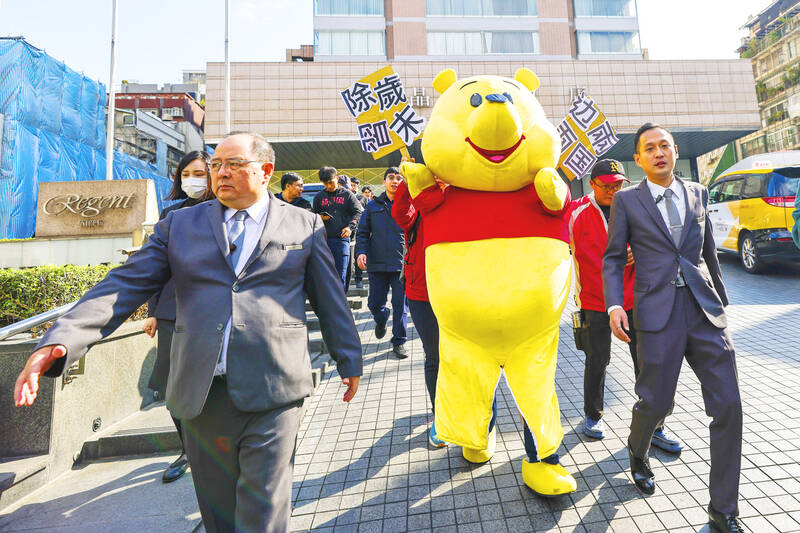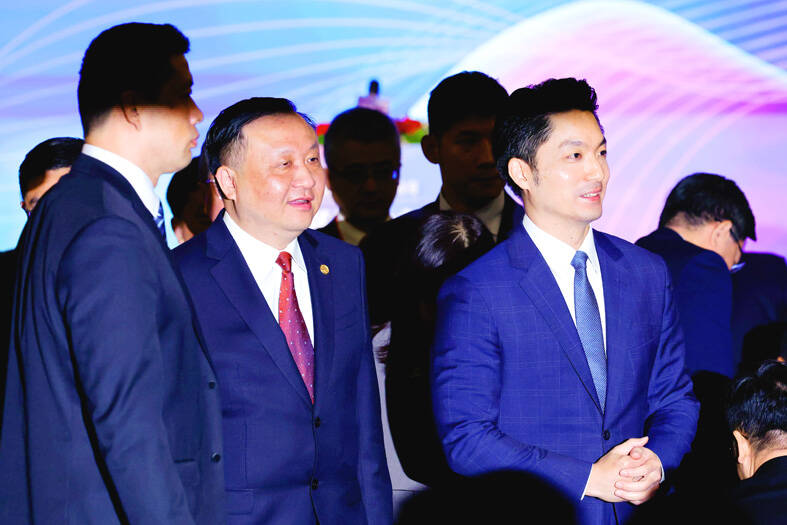Taipei Mayor Chiang Wan-an (蔣萬安) yesterday called for less confrontation between the two sides of the Taiwan Strait, even as Beijing continues to send warships and fighter jets to intimidate Taiwan.
“More dialogue and less confrontation; more olive branches of peace and less sour grapes of conflict. More lights from fishing boats to adorn the sunset; less of the howls of ships and aircraft,” Chiang said at the 15th Taipei-Shanghai Twin-City Forum.
“I always say that the more tense and difficult the moment, the more we need to communicate,” he said.

Photo: Ritchie B. Tongo, EPA-EFE
Between Monday and yesterday, China sent 10 military aircraft and seven other aircraft toward Taiwan, the Ministry of National Defense said, adding that four of the aircraft crossed the median line of the Taiwan Strait.
The forum, first held in 2010, is one of the few high-level venues for talks between Chinese and Taiwanese officials after China cut off a regular dialogue mechanism with the government in 2016 following the election of former president Tsai Ing-wen (蔡英文).
Tsai of the Democratic Progressive Party and her successor, President William Lai (賴清德), refuse to acknowledge Beijing’s position that both China and Taiwan are part of “one China.”

Photo: Ritchie B. Tongo, EPA-EFE
Lai says only Taiwanese can decide their future and rejects Beijing’s claims of sovereignty.
Shanghai Vice Mayor Hua Yuan (華源) told the forum that he hoped for closer practical cooperation.
“Compatriots on both sides of the Taiwan Strait have always been one family. We often come and go, getting closer and closer to each other,” Hua said.
Taiwan banned nine Chinese reporters from the gathering, saying they were superfluous, along with a Shanghai official from China’s Taiwan Affairs Office, in response to harsh new penalties targeting “diehard Taiwan independence separatists.”
The Mainland Affairs Council said that Beijing’s move had severely disrupted already meager bilateral exchanges and put Taiwanese in China at risk.
Taipei Deputy Mayor Lin Yi-hua (林奕華) said that the forum’s theme this year is “intelligent governance and a sustainable future.”
A total of 45 memorandums of understanding are to be signed during the forum, covering topics such as animal welfare, sports, arts, culture and civil exchanges, she said.
Meanwhile, outside the Regent Taipei Hotel where the forum was held, members of the Taiwan Statebuilding Party, the Green Party, the New Power Party, the Northern Taiwan Society and the World United Formosans for Independence held a news conference to protest the forum.
The groups questioned why Chiang invited the Shanghai officials, despite increased military tensions in the Taiwan Strait, and incursions by aircraft and naval vessels.
Citizens should have a clear sense of the enemy and not hold unrealistic expectations of China, Taiwan Statebuilding Party Chairman Wang Hsing-huan (王興煥) said.
The protest is a way of telling China that Taiwan does not accept the idea of unification by force and to communicate to the international community that the nation would stand firm in its defense, he said.
Additional reporting by Ho Yu-hua, Lin Cheng-hung and CNA

SECURITY: As China is ‘reshaping’ Hong Kong’s population, Taiwan must raise the eligibility threshold for applications from Hong Kongers, Chiu Chui-cheng said When Hong Kong and Macau citizens apply for residency in Taiwan, it would be under a new category that includes a “national security observation period,” Mainland Affairs Council (MAC) Minister Chiu Chui-cheng (邱垂正) said yesterday. President William Lai (賴清德) on March 13 announced 17 strategies to counter China’s aggression toward Taiwan, including incorporating national security considerations into the review process for residency applications from Hong Kong and Macau citizens. The situation in Hong Kong is constantly changing, Chiu said to media yesterday on the sidelines of the Taipei Technology Run hosted by the Taipei Neihu Technology Park Development Association. With

CARROT AND STICK: While unrelenting in its military threats, China attracted nearly 40,000 Taiwanese to over 400 business events last year Nearly 40,000 Taiwanese last year joined industry events in China, such as conferences and trade fairs, supported by the Chinese government, a study showed yesterday, as Beijing ramps up a charm offensive toward Taipei alongside military pressure. China has long taken a carrot-and-stick approach to Taiwan, threatening it with the prospect of military action while reaching out to those it believes are amenable to Beijing’s point of view. Taiwanese security officials are wary of what they see as Beijing’s influence campaigns to sway public opinion after Taipei and Beijing gradually resumed travel links halted by the COVID-19 pandemic, but the scale of

A US Marine Corps regiment equipped with Naval Strike Missiles (NSM) is set to participate in the upcoming Balikatan 25 exercise in the Luzon Strait, marking the system’s first-ever deployment in the Philippines. US and Philippine officials have separately confirmed that the Navy Marine Expeditionary Ship Interdiction System (NMESIS) — the mobile launch platform for the Naval Strike Missile — would take part in the joint exercise. The missiles are being deployed to “a strategic first island chain chokepoint” in the waters between Taiwan proper and the Philippines, US-based Naval News reported. “The Luzon Strait and Bashi Channel represent a critical access

Pope Francis is be laid to rest on Saturday after lying in state for three days in St Peter’s Basilica, where the faithful are expected to flock to pay their respects to history’s first Latin American pontiff. The cardinals met yesterday in the Vatican’s synod hall to chart the next steps before a conclave begins to choose Francis’ successor, as condolences poured in from around the world. According to current norms, the conclave must begin between May 5 and 10. The cardinals set the funeral for Saturday at 10am in St Peter’s Square, to be celebrated by the dean of the College